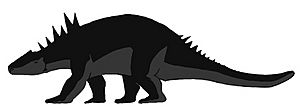Acanthopholis facts for kids
Quick facts for kids Acanthopholis |
|
|---|---|
 |
|
| Artist's rendering of Acanthopholis | |
| Scientific classification |
|
| Kingdom: | Animalia |
| Phylum: | Chordata |
| Clade: | Dinosauria |
| Order: | †Ornithischia |
| Family: | †Nodosauridae |
| Subfamily: | †Acanthopholinae Nopcsa, 1923 |
| Genus: | †Acanthopholis Huxley, 1867 |
| Binomial name | |
| †Acanthopholis horrida Huxley, 1867
|
|
| Synonyms | |
|
|
Acanthopholis (say "Ah-kan-THOFF-oh-liss") was a type of dinosaur that lived a long, long time ago. Its name means "spiny scales," which is a great way to describe it! This dinosaur was an ankylosaur, known for its strong, bony armor.
Acanthopholis was a plant-eating dinosaur that walked on four legs. It had rows of tough, oval plates built right into its skin, like a natural suit of armor. It also had sharp spikes sticking out from its neck and shoulder area, running along its spine. This dinosaur was about 4 meters (15 feet) long and weighed around 380 kilograms (about 840 pounds). That's roughly the weight of a small car!
Discovering Acanthopholis
The very first pieces of Acanthopholis were found in 1865. A fossil collector named John Griffiths discovered them. He found the fossils on the shoreline near Folkestone, a town in southern England.
Where it Lived
The fossils were found in a type of rock called Cambridge Greensand. This rock formation dates back to the Lower Cretaceous period. During that time, England was part of a huge, warm tropical river delta. The Greensand rock formed just offshore from this delta. It seems that dinosaurs like Acanthopholis lived along the shoreline or in the river delta. Sometimes, their bodies would wash out into the sea after they died. This is how their remains ended up in the offshore sediments that later became rock.
Images for kids
See also
 In Spanish: Acanthopholis horrida para niños
In Spanish: Acanthopholis horrida para niños
 | Audre Lorde |
 | John Berry Meachum |
 | Ferdinand Lee Barnett |

